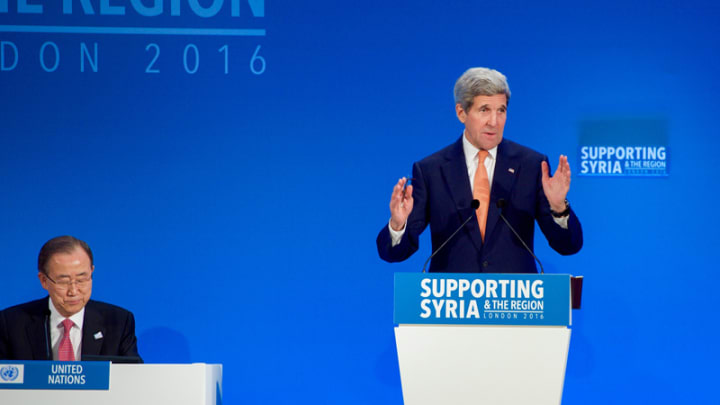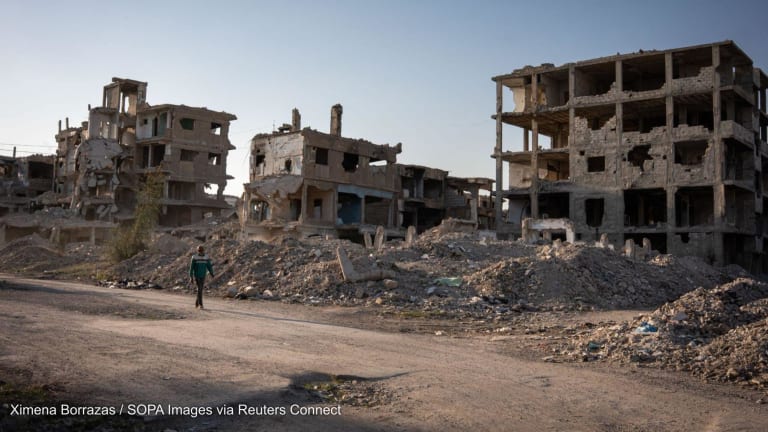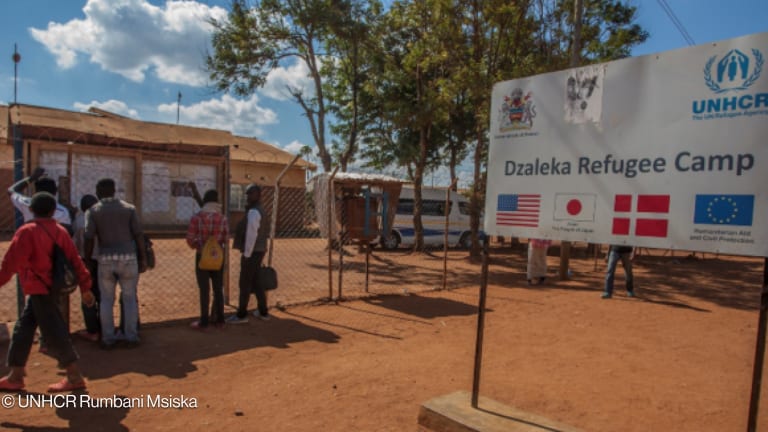
Nearly five years of war in Syria have led to the biggest and most complex humanitarian emergency of our time. The Assad regime has waged a relentless campaign of violence and starvation against his own people.
The tragic consequences of this conflict have unfortunately become familiar images — men, women and children bombarded daily, dying in besieged areas, and embarking on dangerous journeys in search of a safer and more prosperous future beyond Syria’s borders. Over half of all Syrians are either dead or displaced from their homes.
At the Syria donors conference in London last week, U.S. Secretary of State John Kerry announced an additional $601 million in U.S. humanitarian assistance for Syrians and nearly $300 million in U.S. development funding for Syria’s neighbors affected by the crisis. The United States is the largest donor to this effort, providing more than $5.1 billion in humanitarian aid since the Syria crisis began.
What a quid pro quo could do for Syrian refugees
The Syria donors conference was an attempt to shift the aid needle toward longer-term development in war-torn Syria. If donors follow through, Thursday's approach could mark a sea change in the humanitarian and development disconnect.
At great personal risk, our heroic partners are doing everything possible to meet the immediate needs of Syrians across borders and across conflict lines — reaching millions of people across all 14 governorates of Syria.
In London, the international community announced $5.9 billion in funding to support humanitarian, resilience, and development activities in 2016. Additionally, the international community has pledged $5.4 billion in funding for 2017 to 2020 to continue the longer term needs for the Syria crisis response.
The commitment to 2020 and broad international support demonstrates the inclusive and comprehensive nature of commitment that will enable forward planning. Multilateral development banks and other bilateral donors also announced up to $40.8 billion of loans, of which $1.6 billion is on concessional terms.
What it really means is that the funding announced in London will enable the U.S. to feed more than 5 million people inside Syria and neighboring countries. It will allow us to continue our support for 140 health clinics that treat millions of people and repair critical water and sanitation facilities. And it will support a renewed call for the protection of civilians who are the target of attacks.
We hear every day from partners whose hospitals, offices and homes are being bombed by the Assad regime and Russian forces. The status quo is simply unacceptable. We also know that protecting women and girls is tantamount in an environment where too many of them are being raped, threatened with honor killings and even sold into sex slavery in areas held by the Islamic State group.
“We must continue to support our partners as they take on the role of hosting such a major portion of their own population.”
— Paige Alexander and Thomas Staal of the U.S. Agency for International DevelopmentThe U.S. government is leading the humanitarian response inside Syria — and even as we provide immediate, lifesaving humanitarian assistance, we are working to expand opportunities for adults to work and for youth to attend school. Uprooted from their homes and removed from their classrooms, Syria’s children are at risk of becoming a “lost generation.” The U.S. Agency for International Development places a high priority on the education needs of children and young people affected by crisis and conflict around the world. We all share a responsibility to act.
The continuum from humanitarian relief programs to longer term development is crucially important and was recognized at the London conference. We committed nearly $300 million in new funding, which will increase access to high-quality education for all students in Jordan and Lebanon, including nearly 300,000 Syrian refugees. We will continue to train thousands of teachers; develop curriculum; build, expand or renovate hundreds of schools in the region; and provide alternate pathways to education to ensure that all children and youth have opportunities for their future.
Syria crisis: Humanitarian agencies urge unimpeded access
After the opening week of peace talks aimed at ending the war in Syria were suspended only three days after they began, Devex shares a recent call from humanitarian organizations to stop the suffering and place pressure on all parties to end the blockade on urgently needed humanitarian assistance.
As King Abdullah II of Jordan and Prime Minister Tammam Salam of Lebanon said last week, Syria’s neighbors are strained by the influx of refugees. These countries have generously hosted millions of refugees even while they face challenges at home. We must continue to support our partners as they take on the role of hosting such a major portion of their own population.
We are working to ensure that the humanitarian assistance we provide to Syrian refugees has benefits for the local economies in which they are living.
For example, we fund food voucher debit cards for Syrian refugees. These cards are used to show in local supermarkets and stores. They give the users a dignified way to buy food for their families, while also providing an important economic boost to the host country. It is estimated that the program has injected $1.25 billion into the region’s economies and created over 1,300 new jobs.
In Lebanon we have improved access to water for more than a quarter million people. We are the largest donor to Jordan’s health sector, with 70 percent of all deliveries taking place in public hospitals we helped renovate. USAID’s investments in these host communities create more resilient water, health and education systems that will provide continued benefits after this crisis has passed.
The crisis will soon enter its sixth year, and the need for lasting benefits beyond basic needs and essential services is paramount for any future rebuilding of Syria.
The conference in London represented a milestone, a recognition of the pressure on countries hosting refugees. We must strengthen their ability.
Join the Devex community and access more in-depth analysis, breaking news and business advice — and a host of other services — on international development, humanitarian aid and global health.





